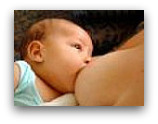Infant Acid Reflux
"How to Help Your Baby"
Does my baby have infant acid reflux?
Since the digestive tract isn't fully developed in newborns, acid reflux is fairly common in babies. The good news is that it usually peaks within three to four months of the infant’s life.
Additional good news is that in most cases, acid reflux symptoms disappear altogether by the time the baby reaches its first birthday.

Studies show that approximately 65% of newborns display symptoms of infant acid reflux, and only about 1% continue suffering past their 12th month.
Unfortunately the few infants that do continue often prove to have the more serious condition known as GERD.
Gerd is a chronic condition requiring medical attention before embarking on a natural cure. This applies whether your child is a baby, a toddler or a teenager.
----Sidebar----
Many sufferers engage in a relentless
Internet hunt for effective remedies, and
this is where interactive websites and
forums, such as our own Pay It Forward
section, play an important part.
----Sidebar----
~~~~~~~~~~~~~~~~~~~~~~~~~~~~~~~~
What are the Symptoms of Acid reflux in Babies?
There are quite a few. Some are mild, whereas others could be severe. A list of symptoms is as follows:
- Colicky behavior where a child is fussy and appears to be in pain.
- Grimacing and arching the back.
- Frequently spitting up, regurgitating and re-swallowing food.
- Persistent cough.
- Poor sleeping patterns.
- Fussiness and crying shortly after feeding.
- Reluctance to nurse or accept formula due to the pain associated with heartburn.
- Poor growth patterns.
- Recurrent congestion or pneumonia.
~~~~~~~~~~~~~~~~~~~~~~~~~~~~~~~~
What action can I take?

Breast is best… Observations show that heartburn does not occur as often and is less severe if you breast-feed your baby.
Mother's milk contains important antibodies that contribute towards baby’s health and growth. In addition to that, it is easier to digest and it passes through baby’s stomach quicker.
In fact, studies show that a breast-fed baby digests mother’s milk twice as fast as it digests artificial formulas.
This is important. The longer food remains in the stomach, the more chances of it regurgitating and causing discomfort.
If direct breast feeding is out of the question for some reason, use a breast pump and bottle feed the contents to your baby instead of using formula.
*Warning.

If you bottle-feed your baby, do not fall for the old wife’s tale of thickening the formula with cereal.
Old conventional thinking was that it would be harder for the baby to regurgitate semi solids. However this is not true, in fact, this practice may cause more harm than good for the following reasons:
- Regurgitating semi-solids could cause injury to baby’s delicate food pipe (esophagus).
- There is the unnecessary risk of solids being aspirated into the lungs after the baby spits up.
~~~~~~~~~~~~~~~~~~~~~~~~~~~~~~~~
Infant Acid Reflux - Some Helpful Tips
- Keep baby in an upright position during feeding. Gravity helps food pass into the stomach.
- Feed baby more frequently with smaller portions.
- Burp often.
- If you breast feed, keep a log of your meals. Try to identify any heartburn triggers that you are ingesting and passing on to your baby through your milk.
These include caffeine taken via coffee or cola, dairy product and processed or acidic foods.
- After feeding, position the baby in a 45-degree semi-upright position for at least an hour.
- Better yet, use a baby sling or front carrier after feeding. This will also benefit both you and your baby by additional mother/child bonding through close contact.
----Sidebar----
Click here for an unbiased review
of an important acid reflux eBook.
----Sidebar----
Need Help?
e-mail us at: remedybusters@gmail.com or click here.
~~~~~~~~~~~~~~~~~~~~~~~~~~~~~~~~
Was This Article Helpful?
If so, a small donation (even $1) would help underwrite the cost of maintaining this website, and allow us to provide even more free home remedy content.
To make a donation, use the button below and fill in an amount. Thanks!
PayPal - The safer, easier way to donate!
~~~~~~~~~~~~~~~~~~~~~~~~~~~~~~~~
References
Mayo Clinic: Infant Acid Reflux
- Information at www.mayoclinic.com
Back to the Top
~~~~~~~~~~~~~~~~~~~~~~~~~~~~~~~~
Back to the Home Remedy Site home page, from Infant Acid Reflux
~~~~~~~~~~~~~~~~~~~~~~~~~~~~~~~~



